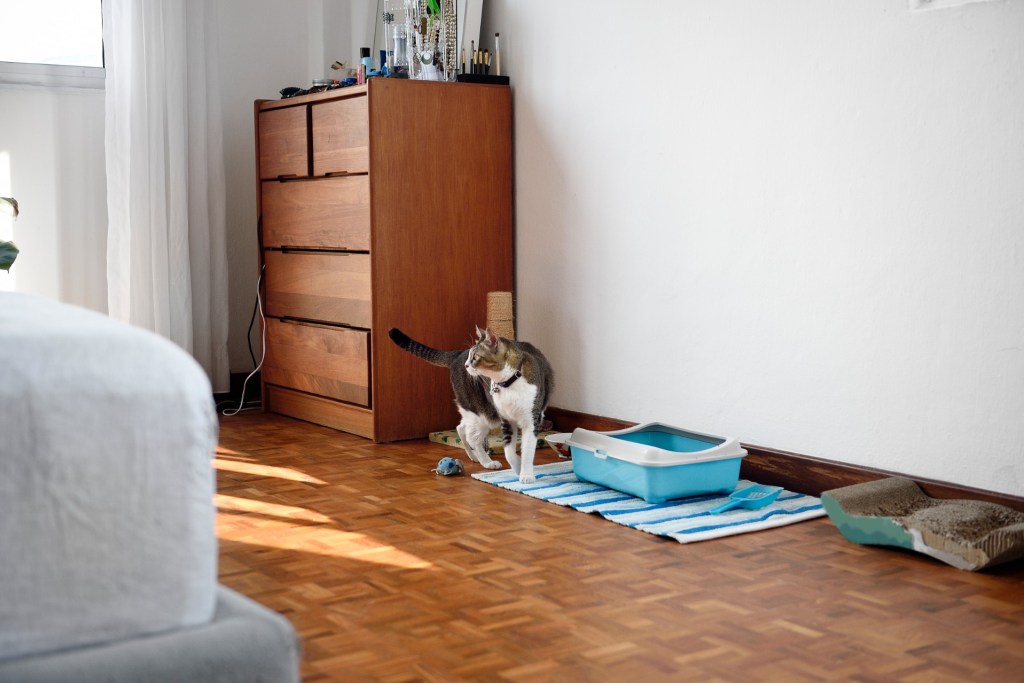It is well-known that cats can easily be trained to use a litter box. What is less known, however, is why they place litter over their waste. Why do cats cover their pee? Why do they bury their poop? Learn why in this short article.

The evolution of burying waste
Cats are exceptionally clean animals. This is not the only reason that they bury their waste, though. All cats instinctively cover their waste. This includes wild cats, too. Although they don’t have litter in the wild, dirt, sand, and soil all work well to cover excrement. This instinct derives from the use of urine and feces to mark territory. A unique combination of scent markers called pheromones are characteristic of each individual cat’s feces. So while all cat poop probably smells the same to you, cats can identify one another by the way their poop smells.
Dominant cats like lions, tigers, and leopards do not always cover their feces, instead leaving it uncovered to mark their territory. Other cats further down the food chain usually do bury their waste in order to not appear as a threat to more dominant cats. Moreover, cats of all sorts bury their waste so as to not attract predators since burying something decreases its smell. Domestic cats know that they depend on humans to survive and are not the most dominant in a household, which is why they too cover their poop and pee. Burying waste may also serve to decrease the prevalence of parasites, thereby reducing the chance of contracting a parasite-borne illness.
Why doesn’t my cat cover their excrement?
You may find that your cat does not always bury their waste. In rare cases, this may be because they feel that they are the dominant animal in a household. Sometimes it happens because of an underlying health condition. For instance, stomach problems or urinary tract infections can contribute to a cat not covering their waste. Your cat may be going blind and cannot see its box clearly.
In older cats, arthritis may make it painful to use a litter box. Similarly, a cat that has recently been declawed or has a paw injury might find that spending time in a litter box or burying their waste hurts. For cats with arthritis or a paw injury, consider investing in a litter box that has at least one low side so they can easily enter and exit.

Lack of training
A lack of thorough training may also lead to your cat not burying their excrement. Kittens learn how to use a litter box by watching their mother, so if they are separated from their mother at a young age, they may need some extra help learning how to use a litter box properly.
Other possible reasons for this issue is the fact that your cat might just feel lazy. Or maybe, the litter box is too dirty or too small, or they don’t like the type of litter in their box. To make sure your cat’s litter box is long enough, check that it can accommodate the full length of your cat when they are lying down. You should clear a litter box of waste daily, and change all of the litter out around every two weeks. Be cognizant of any changes in a cat’s behavior after switching the type of litter used in their box. Alternatively, your unspayed cat may be in heat, at which time they will mark their territory with urine in multiple places.
In a multi-cat household, one cat may feel dominant over the others and the need to establish that hierarchy. You might be able to dissolve that hierarchy by providing your cats with multiple litter boxes, spaced throughout your home, to give each cat their own personal territory.
If your cat is regularly not covering their waste or eliminating outside of his or her litter box altogether, you should seek advice from a veterinarian. They will work with you to determine if a medical problem is at play, and will also suggest other methods for solving the problem.
Now you know why cats cover their waste and steps to take if they don’t. You can use your newfound knowledge to help fellow cat owners, too!
Editors' Recommendations
- Why do cats twitch in their sleep? The real reasons behind this curious behavior
- Why do cats cover their face when they sleep? This adorable behavior, explained
- Can a cat’s tail really fall off?
- Why do cats lick themselves? It goes beyond just cat grooming
- Why do cats open their mouths when they smell? It’s for a really cool reason



